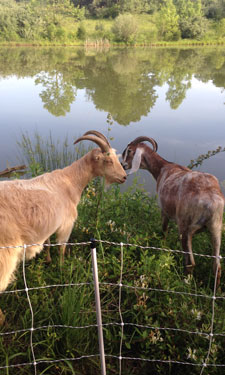 Because they do best eating weeds rather than grasses and are agile climbers, allowing them to reach vines and stems in otherwise hard-to-reach places, goats are an environmentally friendly and extremely effective tool for controlling the spread of noxious weeds. So, when Banshee Reeks Nature Preserve — a pesticide-free, 700-acre preserve in Leesburg, Virginia, that’s owned by Loudoun County and managed through the Department of Parks, Recreation and Community Services — needed to control the spread of invasive plants, it turned to goats, which fit in perfectly with its land management practices.
Because they do best eating weeds rather than grasses and are agile climbers, allowing them to reach vines and stems in otherwise hard-to-reach places, goats are an environmentally friendly and extremely effective tool for controlling the spread of noxious weeds. So, when Banshee Reeks Nature Preserve — a pesticide-free, 700-acre preserve in Leesburg, Virginia, that’s owned by Loudoun County and managed through the Department of Parks, Recreation and Community Services — needed to control the spread of invasive plants, it turned to goats, which fit in perfectly with its land management practices.
“We here at Banshee Reeks Nature Preserve have partnered with Willowsford Farm in ‘Project: Springhouse Restoration!’ The herd of LaMancha, Oberhasli and Nubian goats, located in a fenced-off area, is managing unwanted vegetation naturally — by eating it! This restoration is vitally important because unless invasive plants are managed accordingly, they can take over the landscape, overrun the native plants, threaten important biodiversity and ruin habitat for the native wildlife,” says Julie Paul, the preserve naturalist.
Ron Circé, the preserve manager, and Paul are monitoring the progress, health and success of the herd. “After only three weeks of grazing, these goats have managed to clear almost an acre of the paddock in which they reside. We have had instant gratification and plan on renewing our contract in order to keep the goats through the end of the summer,” says Paul.
Goats are one of the oldest domesticated species, and for centuries have provided humans with milk, meat, hair and skins. They belong to the class of animals called ruminants, characterized by four stomachs and cud-chewing behavior. They graze all day, while fertilizing in the process, and their narrow, triangular mouths allow them to crush what they eat, so seeds that might otherwise get passed through and put back into next year’s seed bank are no longer viable. Special enzymes in their stomachs allow them to eat plants that are poisonous to other animals. Weeds on the menu for the Banshee Reeks herd include Japanese honeysuckle, autumn olive, mile-a-minute, Japanese stiltgrass, Canada thistle, tree of heaven and multiflora rose.
— Sonia Myrick, Managing Editor of Parks & Recreation magazine

